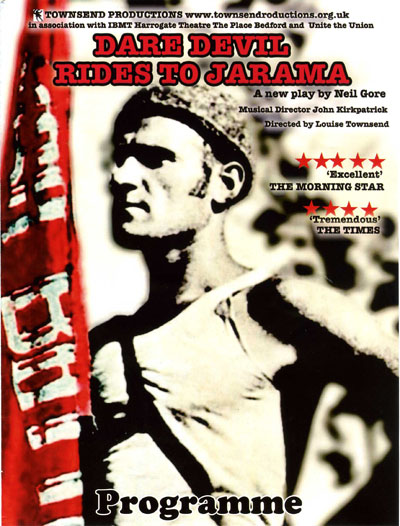|
DARE DEVIL RIDES TO JARAMA A play by Neil Gore Oldham Coliseum Theatre, 12th-15th October, 2016 (and touring) Reviewed by Charles Ashleigh
Itís a long time since I saw any agit-prop theatre. I donít doubt that itís still being performed here and there, but it just hasnít come my way. Which may well be my fault for not keeping up with things. So, the opportunity to see a play about the Spanish Civil War was too good to miss. It largely focuses on the activities of Clem Beckett, who came from Oldham, made a mark as a speedway rider in the late-1920s and early-1930s, joined the Communist Party, and was killed opposing Francoís forces in Spain early in 1937. But it also brings in Christopher Caudwell, poet, literary critic, Marxist theoretician, and committed communist, who died in Spain at the same time, fighting alongside Clem Beckett. The play is split into two halves, the first mostly concerning Beckettís speedway career, his clashes with the authorities controlling the sport, his participation in the Kinder Scout Mass Trespass, and his journey to Spain with ambulances for the British Battalion of the Fifteenth International Brigade. It was at this point that he seems to have met Christopher Caudwell, who had volunteered to drive one of the ambulances. When they got there they both enrolled in the Brigades. The second half of the play is about their experiences during the short time they were together in Spain. Now it may seem that a play performed in a small studio theatre with a cast of two, a minimum of stage fittings, and a maximum audience of around fifty, will have its limitations. It does, one has to admit. But the energy, good humour, and enthusiasm of the actors, Neil Gore and David Heywood, easily overcame whatever minor problems arose during the performance. Both can combine their acting skills with using a number of musical instruments, the play incorporating a variety of songs. They also encourage some audience participation. Heywood has the role of Beckett, while Gore takes on several more, ranging from a German doctor, to the English fascist leader, Oswald Mosley, the head of the British Communist Party, Harry Pollitt, and Christopher Caudwell, of course. The quick changes required are achieved with a minimum of fuss: a different coat, an armband, a hat, being sufficient to indicate who each person is. The same can be said for the sets, which are merely functional, at best. This isnít a criticism, but instead an indication that it largely rests with the actors to convince the audience what is happening and when. Sometimes, a poster or a sign suffices to say where the characters are at a given moment. Nothing else is needed when the pace is fast and the message urgent. The situation in Spain is explained. Franco had Moorish troops from the army in North Africa, and the much-feared Spanish Foreign Legion, plus soldiers, airmen, and ample supplies of guns and ammunition from Italy and Germany. The Republican forces, on the other hand, were hampered by a non-interventionist policy of refusal to supply armaments on the part of Britain, France, and America. Only the Soviet Union would offer any assistance, and that at a price. The shortcomings in the training and equipment available to volunteers in the International Brigades are made clear. Itís little wonder that when the British Battalion went into action the casualties, including Beckett and Caudwell, were high. Thereís a line in a poem by the American poet, Alfred Hayes, where heís looking back at his own radical involvements in the 1930s, and says: ďWho now remembers the volunteers to Spain?Ē Not too many people, I would guess, but it was heartening to see that the small, enthusiastic audience in the theatre in Oldham seemed determined not to forget them. Dare Devil Rides to Jarama is touring the country. You should try to see it.
|
